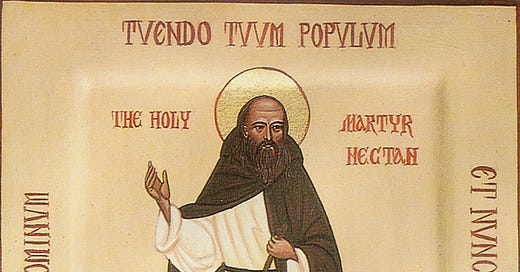“If the work of God could be comprehended by reason, it would no longer be wonderful, and faith would have no merit if reason provided proof.”
St. Pope Gregory I
Romans 4:4-12
Brethren, to one who works, his wages are not reckoned as a gift but as his due. And to one who does not work but trusts him who justifies the ungodly, his faith is reckoned as righteousness. So also David pronounces a blessing upon the man to whom God reckons righteousness apart from works: “Blessed are those whose iniquities are forgiven, and whose sins are covered; blessed is the man against whom the Lord will not reckon his sin.” Is this blessing pronounced only upon the circumcised, or also upon the uncircumcised? We say that faith was reckoned to Abraham as righteousness. How then was it reckoned to him? Was it before or after he had been circumcised? It was not after, but before he was circumcised. He received circumcision as a sign or seal of the righteousness which he had by faith while he was still uncircumcised. The purpose was to make him the father of all who believe without being circumcised and who thus have righteousness reckoned to them, and likewise the father of the circumcised who are not merely circumcised but also follow the example of the faith which our father Abraham had before he was circumcised.
Matthew 7:15-21
The Lord said, “Beware of false prophets, who come to you in sheep’s clothing but inwardly are ravenous wolves. You will know them by their fruits. Are grapes gathered from thorns, or figs from thistles? So, every sound tree bears good fruit, but the bad tree bears evil fruit. A sound tree cannot bear evil fruit, nor can a bad tree bear good fruit. Every tree that does not bear good fruit is cut down and thrown into the fire. Thus you will know them by their fruits. “Not everyone who says to me, ‘Lord, Lord,’ shall enter the kingdom of heaven, but he who does the will of my Father who is in heaven.
Martyr Nectan of Hartland
Saint Nectan was born in Wales and lived in the sixth century, but we know few details about his life. He was the oldest of the twenty-four children of Saint Brychan of Brecknock (April 6). While he was still living in Wales, God inspired him to imitate the example of Saint Anthony (January 17) and other ascetics, and to embrace the monastic life.
Seeking greater solitude, Saint Nectan and his companions left Wales, intending to settle wherever their boat happened to land. Divine providence brought them to the northern coast of Devonshire at Hartland, where they lived for several years in a dense forest. The saint’s family would visit him there on the last day of the year. Later, he relocated to a remote valley with a spring.
Once, Saint Nectan found a stray pig and returned it to its owner. In gratitude, the swineherd gave Saint Nectan two cows. The saint accepted the gift, but the cows were soon stolen by two robbers. Saint Nectan found the thieves who took the animals, and tried to preach to them about Christ. They became angry and cut off his head. Then the saint picked up his head and carried it for half a mile, laying it down near the spring by his cell. Seeing this, the man who killed Saint Nectan went out of his mind, but the other thief buried the Saint. From that time, miracles began to take place at Saint Nectan’s tomb.
In 937, on the eve of the Battle of Brunanburgh, a young man from Hartland who was in a tent near King Athelstan’s pavilion suddenly felt himself afflicted with the plague which was then destroying the English army. The young man wept and called upon God and Saint Nectan to help him. His cries were so loud that he woke the king and others around him.
Saint Nectan came to the young man just after midnight and touched the afflicted area of his body, healing him. In the morning, he was brought before the king and admitted that it was he who had disturbed Athelstan’s sleep. The king asked gently why he had been crying out during the night.
The young man explained that he felt himself stricken with the plague, and was afraid that he would die. Therefore, he entreated God and Saint Nectan to help him, and his prayer was answered.
Athelstan asked for more information about the life and martyrdom of Saint Nectan, which the young man provided. He also urged the king to turn to Saint Nectan with faith, promising that he would be victorious in battle if he did so.
The king promised to honor God and Saint Nectan, and so his faith was rewarded. Not only did he win the battle, but the plague disappeared and his soldiers recovered. The first time that King Athelstan visited Hartland in Devonshire, he donated property to the saint’s church. For the rest of his life, the king placed great confidence in the intercession of Saint Nectan.
Saint Nectan is the patron of Hartland, Devonshire. The fullest surviving Life dates from the twelfth century (See Vol. 5 of THE SAINTS OF CORNWALL by G. H. Doble for an English translation).
There is an Orthodox house chapel (Russian diocese of Sourozh) dedicated to Saint Simeon and Saint Anna at Combe Martin, N. Devon where Saint Nectan is venerated.
The Paradoxicality of the Logic of the Christian Faith
Fr. Georgios Dorbarakis
The logicality of the Christian faith is often so paradoxical and strange, especially for Orthodox Christians today, that we need to delve into the texts of the Fathers in order to have a feel for it and attune ourselves to it. Though it must be said, of course, that the acceptance and gradual familiarization with this reasoning leads to the ‘jolt’ of the taste of the other way of life which was brought by Our Lord Jesus Christ- to the opening of the eyes and spiritual senses so that the faithful can see and feel eternal life even in what’s considered this narrow and wretched life. So that they can see the unseen and eternal, as Saint Paul says.
To be more precise: temptations and sorrows, for example, are part of our life but we all see them as negative or avoidable, to such an extent that even the Church, by concession to our weakness, continually prays that we may not encounter them in our life. And yet, when we see them from the point of view of faith, as the saints do, they’re regarded as stepping-stones leading us to an ascent in the spiritual life, which means a more personal and vital relationship with God. They tell us: ‘Take temptations out of life and nobody’ll be saved’. Because through temptations, sorrows and tribulations we’re clearly called upon to struggle with our self, to overcome our weaknesses, to make room for God to abide within us.
Saint Isaac the Syrian is one of the ascetic fathers who introduces us into the mysteries of the logic of the faith in the most graphic terms: ‘The further you progress on the road to the Kingdom of God and you draw closer to him, take it as a sign that you’ll encounter the power of temptations. The further you go, and progress, the more the temptations increase and arise against you… Because God brings the sorrows of temptations to your soul commensurately to the amount of divine grace’. So temptations and sorrows are a sign that you’re on the right path. But he also tells us something equally important: before the temptations and tribulations befall us, God strengthens us with his grace. It’s as if he measures our strength in some way and allows whatever we can bear in order that we may ascend higher. Why? Because the essential thing for Christ our God- and this is where the logic of faith is best shown- isn’t whether we undergo sorrows and trials. That’s a given, because humankind fell into sin. What’s essential, the enduring desire of our Creator and Father, is for us to be with him and to maintain our living relationship with him, with his help. He wants us to be one with him. Gods within his godhead. He ‘ignores’, though without ignoring or pretending not to see, although he does see and suffers our tribulations along with us. It’s the balm we need to be cured.
Let’s listen to Saint Isaac again: ‘Temptations won’t come unless the soul first secretly receives some power over and above its own through the grace of the Holy Spirit. Proof of this is the temptation of the Lord and the temptations of the apostles, who weren’t really tempted until they received the Holy Spirit. Because those who receive good things have to undergo the temptations of those good things. Good things are accompanied by sorrows. It’s our all-wise God’s good pleasure to deal with all his works like this. And if the bestowal of grace precedes the temptations, the feeling of temptations precedes the sense of the presence of grace. This is in order to test our freedom. Because grace isn’t felt before we taste the bitterness of temptations. Grace actually precedes, but its action isn’t felt until later’.
These are secrets of our faith which, the more we know them, the more we’re moved by God’s love; the more we understand his Passion, which he submitted to for our sake; the more we accept patience as the only road to our salvation.
This week’s calendar reminders:
Monday 6/16: Matins 8:30 a.m.; Stewards Meeting 6:30 p.m.; Apostles Fast Begins
Tuesday 6/17: no services or events
Wednesday 6/18: no services or events
Thursday 6/19: Matins 8:30 a.m.; FORCC Meeting at CTS 6:30 p.m.
Friday 6/20: Matins 8:30 a.m.
Saturday 6/21: Catechumen Class 4:30 p.m.; Choir Practice 5 p.m.; Great Vespers 6 p.m.
Sunday 6/22: Hours & Divine Liturgy 9:15 a.m.
CLICK BELOW to donate online:
Christ the Savior Orthodox Church is located in Southbury, Connecticut, and is part of the New England Diocese of the Orthodox Church of America.
Mailing address: Christ the Savior Church, 1070 Roxbury Road, Southbury, CT 06488
PLEASE DONATE to help our parish do the work of the Lord, thrive and grow, and extend the Kingdom of God. May the Lord bless your generosity!
Fr. Moses Locke can be reached at frmoseslocke@gmail.com











